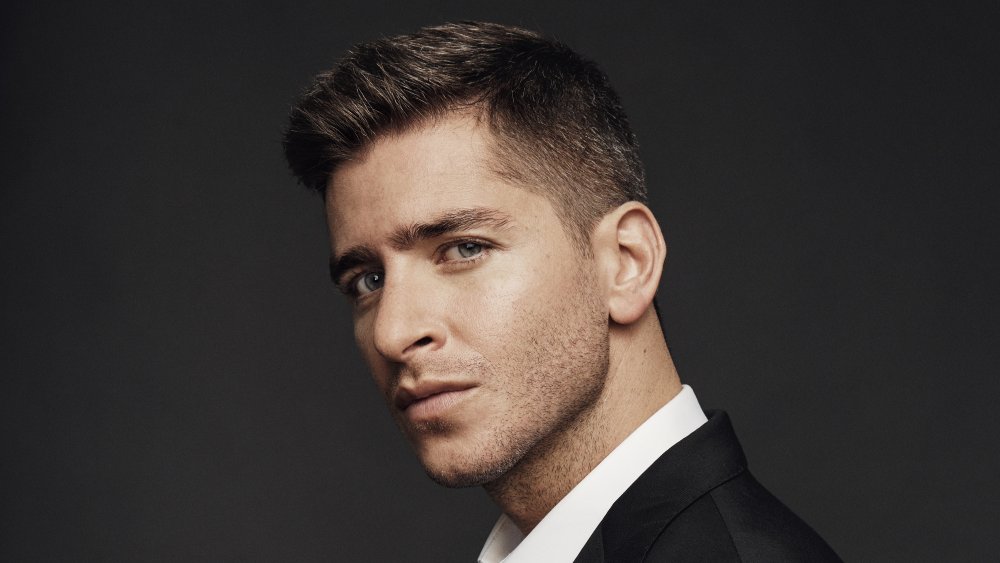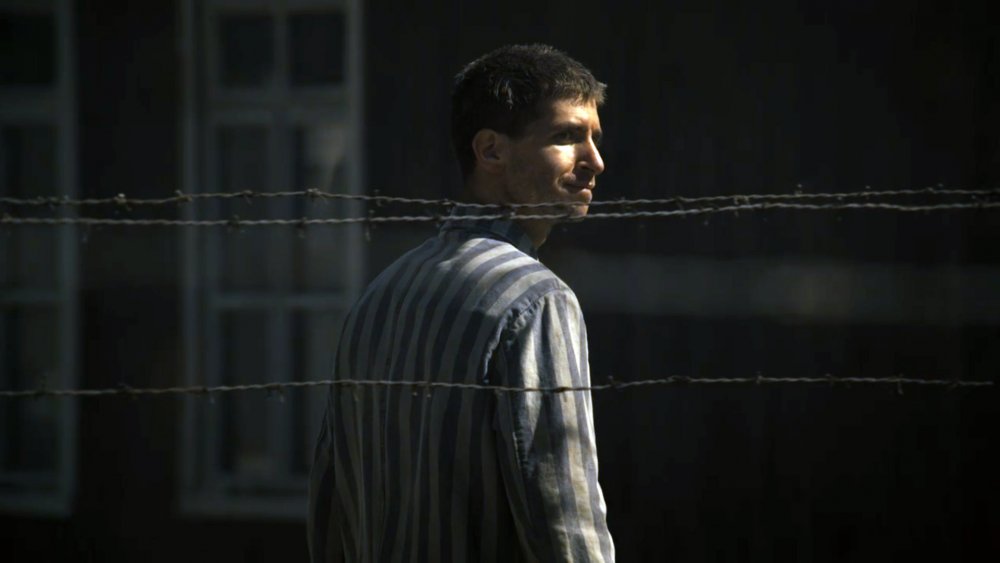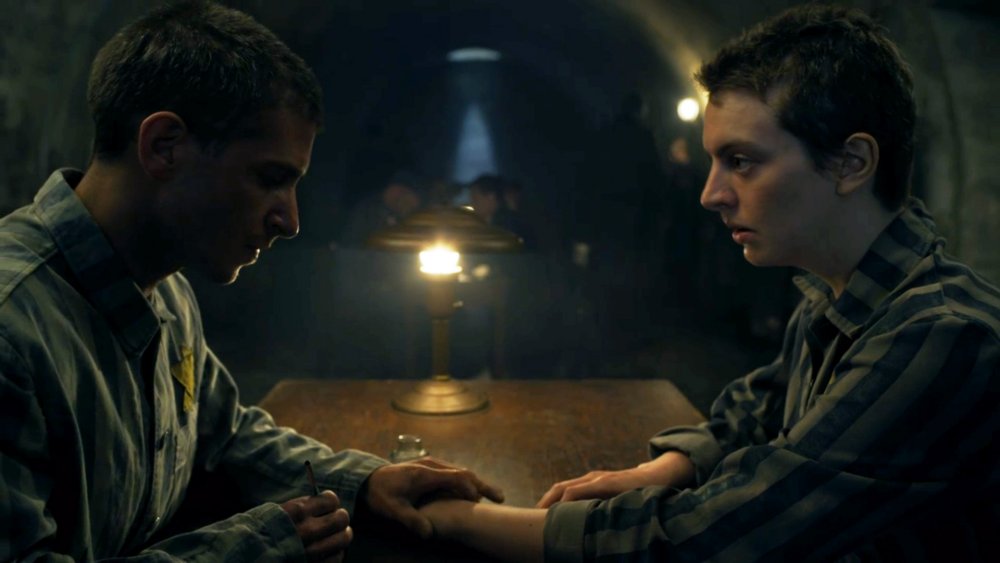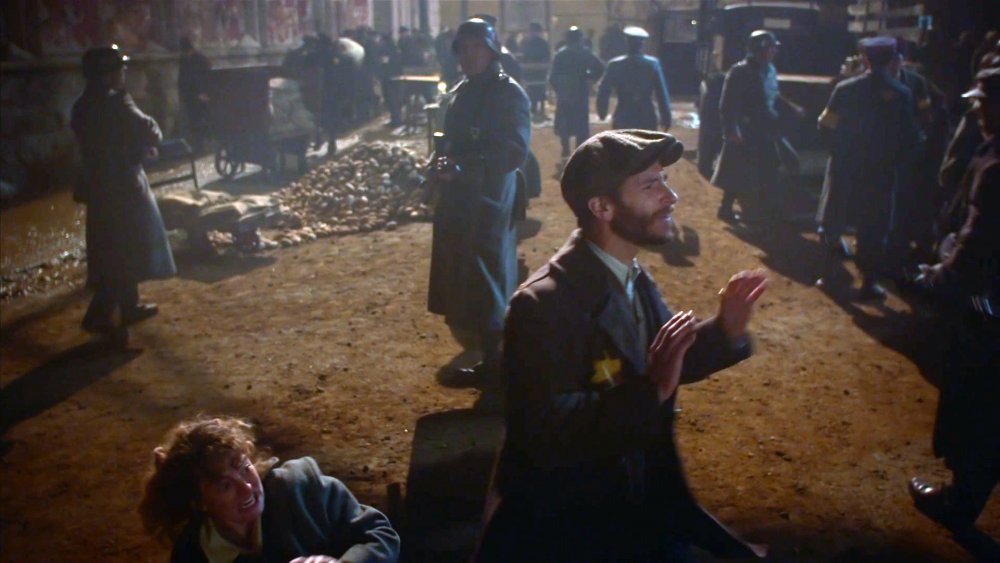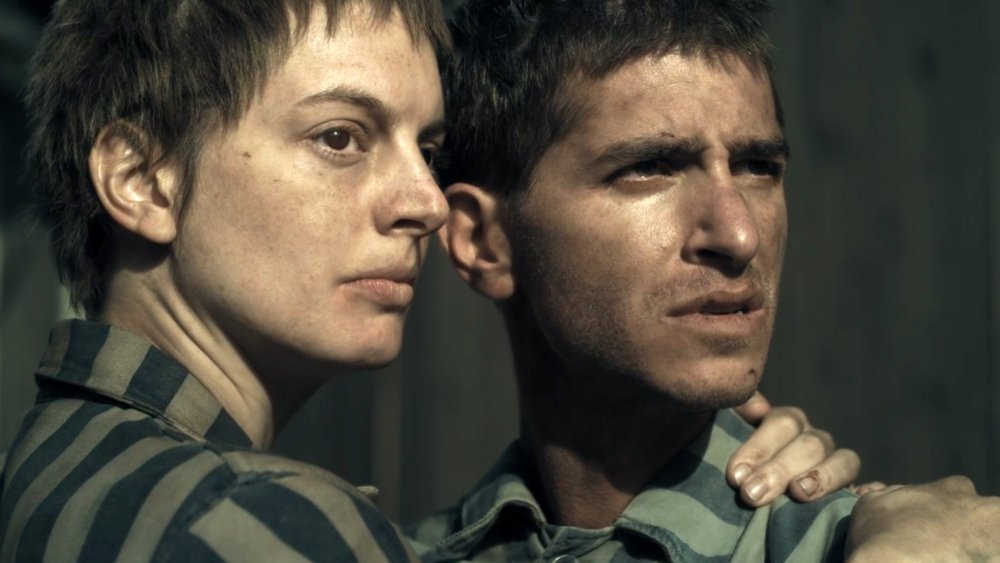Actor Zack Schor Dishes On Playing Young Al Pacino On Amazon's Hunters - Exclusive Interview
David Weil's Hunters, which debuted on Amazon Prime last month, is unlike any other Holocaust drama you've seen before. On one hand, it's a sobering and terrifying look at the horrors Jews faced under the Nazi regime. On the other, it's a brightly colored, '70s-style revenge story in which Al Pacino, chewing the scenery as elderly Holocaust survivor Meyer Offerman, assembles a vigilante strike forced dedicated to hunting down former members of the Third Reich who are hiding out in America.
For actor Zack Schor, there was a third element to the show, too: a chance to engage with his family's past. In Hunters, Schor plays the young version of Pacino's character during the show's many flashbacks to Nazi Germany, where an unconventional love story between Meyer and Ruth Heidelbaum (Anne Hagg, in the flashback sequences) unfolds.
It was challenging work for the young actor, who went to great lengths to do the role justice. Around the time of Hunters' premiere, Schor took some time to talk with Looper about how he prepared to play Meyer, what it's like working on a show with such heavy source material, and his personal connection to the show. Here's what he had to say.
The real stories that inspired Zack Schor to join Hunters
So, from what I understand, Hunters is kind of a personal project for you.
Yeah, yeah. I definitely felt a really special connection to this project as soon as the script came across my desk, so to speak. My grandparents, both of my dad's parents, are Holocaust survivors. And so, the opportunity to play a character that was a victim of the Holocaust and to have a part in telling that story, which I think is one that's really important to tell, felt really special and resonated with me on another level.
Do your grandparents talk much about their experiences in the Holocaust?
They have. It's obviously uncomfortable but over the years we've definitely had some conversations about it and they told me some stories. Each of them lost a number of family members, respectively. My grandmother grew up in Paris, and during the war she and her family fled to the South of France where they lived in hiding. They managed to elude capture.
My grandfather was born in Poland and he and his family made their way through Poland and into Hungary during the war. And he wound up in a camp in Budapest, or rather, right outside of Budapest. So those are kind of the broad strokes of their stories. I think it's obviously challenging for them to talk about it, but they're both excited for this project. Like I said, it's an important story that needs to be told. So, it really felt like an honor to be able to take part in that.
Have they seen the show?
My grandmother started watching. I think it's difficult and she kind of takes it in small doses, but she's very excited for me and wants to be very supportive and knows that it's important. I think it's a little bit more difficult for my grandfather. I don't believe he started watching, but we'll see.
Has your grandmother given you any thoughts on the show specifically, other than, obviously, being excited for you?
Nothing too specifically. I think the truth of it is she hasn't watched that much yet. I think she's taking it in small doses, she's watching a little bit at a time. And I think it's hard for her to watch in terms of her own personal memories, but it also makes her sad to think about the bigger picture of what happened and sad to think about some of the ideology that was prevalent through this unbelievable period in our history. It's troubling to see that persisting today. I think we all find that challenging, and that's why a show like this needs to be made and these stories need to be told.
How Zack Schor prepped for his Hunters role
What kind of preparation did you do, mentally and psychologically, to prepare for the part?
I think there's only so much you can do. You know you're going to go to some dark places and — I'll just speak for myself — I don't know that I could have brought as much truth to the character if I isolated myself from that. And so, you just prepare yourself to do that.
I have an acting technique that I use with my coach that is an imagination-based technique. I create a memory for the character and experiences for the character. I think there was so much to mine that that work was really a journey in itself. And before I dug into any of that stuff, I did as much research as I could, just digging into what it was really like to be there in the camps in the ghetto, like I said, bring as much truth to the character as I could out of respect for what it would have been like to be there. As we all know, it's an incredibly dark period in our history. and there's a certain weight to digging so deep into the research but it really felt like it was necessary.
I consumed as much as I could. I watched narrative films and documentary films and read books. I revisited several times throughout the process the book Night by Elie Wiesel, which is largely understood to be an autobiographical story. It's kind of written as fiction, but not really. And not only is it just an incredible piece of work in and of itself, but in terms of resources, it was one of the most impactful things that I came across because it was so visceral. It was so explicit in how it felt to be there. And that was something that really stuck with me.
Most of your scenes are in Polish. Did you speak Polish before you started filming?
The short answer? I didn't, really. I could recognize Polish. I knew a little bit here and there, but the reality is I really didn't speak Polish and I had a lot of studying to do. And as I said, as soon as I got wind of this project and this role and the opportunity to audition for this role, I could tell it was something really special and I wanted to walk into that room and have them see Meyer. I wanted to be undeniable in the role. And so, I lost quite a bit of weight just for the audition. And I didn't know Polish and I went in and auditioned in Polish. And it just felt like the right thing to do.
How much weight did you lose for the audition?
I lost about 20 pounds.
And then you lost 35 for the show?
Yeah. So, I lost 20 pounds and it was kind of up and down. We shot for seven months, so up and down, depending on what the scene called for it. I put some of it back on because the first scene I shot was in the Lodz ghetto. If I was too skinny, then I wasn't going to have anywhere to go. But at my skinniest I was down about 35 pounds.
You're playing a younger version of Al Pacino's character. Did you collaborate with him at all directly?
The reality is, by the time I came on, they were already in pre-production for the pilot. Everything was moving so fast that I didn't get time to sit with him and talk about the character and dig into all that stuff. But I had an idea of what he was going to be doing and I just focused on playing the character. I did my homework, I focused on the character in the story and I focused on telling that story and playing that character as honestly as I could. And I trusted that the people making the show, the people in charge, would steer me and steer Al in the right directions, respectively, to line up in line with each other. And that seems to have been the case.
The most difficult scene in Hunters to film
Where did you guys shoot?
Primarily in the New York area. So, production was based in Brooklyn. The period in the '70s we shot in Manhattan quite a bit. We shot the flashback scenes in Jersey and upstate New York, and then we went to Budapest for a week right at the end of production.
What's it like being on a recreation of a concentration camp, psychologically?
It's intense. It's really intense and I certainly came at it with my own background, but you don't need to be Jewish to understand the core of Auschwitz and the Holocaust. And I think everyone felt the weight of it on those days.
The reality is with a production of this scale, the sets were so fully realized and the wardrobe was so perfect and everything was done so well that, as an actor it's in some ways it's a gift. You're really immersed in it and you can really go to places that I think would be harder to get to if you don't have that immersive environment. But also, it's intense. It made for some really heavy days. The scenes are heavy to begin with and then when you really feel like you're there It really has a weight to it.
The first scene that you see me and Annie Hagg in, in the pilot, is in the Lodz ghetto and it's this just massive scene with all these extras and they dressed up multiple city blocks to look like this town in Poland. And there are German shepherds attacking people and barking and people screaming and things being drawn off of balconies and you really just feel it in your bones. It was a crazy first day on set. There's really no other word than intense. It was incredibly intense. And those were tough days, but we went to great lengths to kind of tell this story as honestly as we could.
Are there any scenes or sequences that you're particularly proud of or that were especially challenging for you as an actor?
It's tough. It was all challenging in its own way because it's just the nature of these kinds of scenes, the way they kind of fit structurally into the whole of the show. Every scene is so intense. There is no flashback that was just a casual scene. I think having Annie there always dialed me in. We got to this place where, when we were in the scene, we were in it together and it was like we were flying.
I would say that first day on set, shooting that scene in the Lodz ghetto, if you watch the show, if you watch the pilot, you'll see that it's actually shot in a "oner," which means that there's no editing, it's just a continuous take with the camera. And that was a challenging scene in any circumstances, but to have that be my first day on set and there's acting to be had little bit in German and a little bit in Polish.... Really, it's just this huge moving piece of choreography and timing. That was a challenging but thrilling experience.
How long did it take you guys to get that shot?
We shot almost all night. Call was a little bit before sundown, so we could do hair and makeup and wardrobe and stuff. And then, by the time everybody's ready, all the extras are ready, everything's in place, the sun had gone down, we did a bunch of takes. So, we shot most of the night.
A lot of times when you're chasing daylight, as they say, when the sun's about to come up, a lot of times you're racing to get that shot in. And we actually finished with a good couple of hours until the sun came up. At that point, it had been a really long night, but there was something really gratifying about knowing, okay, if we needed to keep going, we could have. And that was really cool. That was really cool.
Why Amazon's Hunters is still relevant today
The show has been kind of controversial. The Auschwitz Museum issued a statement about it, for example. Were you expecting controversy?
Yeah. I think that the show pushes the envelope in a lot of ways and is really provocative and I think it's inevitable that that was going to provoke some people. Of course, I have so much respect for that organization and it's unfortunate that that was what they took away from it. I think that ultimately my feeling is that both of us, the Auschwitz Museum and anyone else who takes a position in line with them, and us being the people who made the show, I think that we're ultimately coming from the same place, which is wanting to tread as carefully and respectfully over this sensitive material as we can.
I'm stealing some of [Hunters creator] David Weil's thoughts on this. He made a statement in response that I agree with, which is that it is more respectful to tell a fictional story that is representationally true than to tread anywhere near a real person's real story and do anything that would be disrespectful. It's better to tell a fictionalized version of the truth that has the same truth at its heart than to tell a half truth of somebody's real story.
Is there anything about this show that you haven't gotten to say yet that you'd like to or something that you feel deserves more attention than it's getting?
I have said this before but I'll say it again because I think it's important, which is just that unbelievably we are living in a time where it feels especially important to remind ourselves of what happened and what can happen when we engage in hate speech and fearmongering. We've seen where the world goes when our leaders do that and we follow them. And all I can say is that it feels like we are, in the world but especially in this country right now, at a real crossroads. We can choose to keep going in the direction we've been going in or we can change directions. And I think that if one person is convinced to go out and vote because they read this article, then I will be immensely grateful for it.
